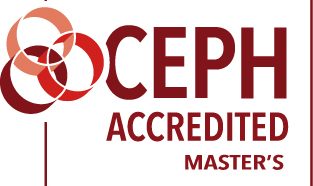Western Region Graduate Program

Public Health - Health Promotion, Master of Public Health
- Available Emphasis Areas:
- Indigenous Health - Emphasis
- Public Health Coursework
The Emphasis in Indigenous Health is only offered at the Flagstaff Campus.
This program prepares you for professional practice in public health and applied research settings as well as further academic study in public health related fields. Through quality classroom instruction, applied practice experience, and a public health project, students will be adequately prepared for employment within public health agencies.
Requirements Accordion Open
To receive a master’s degree at Northern Arizona University, you must complete a planned group of courses from one or more subject areas, consisting of at least 30 units of graduate-level courses. Many master’s degree programs require more than 30 units.
You must additionally complete:- All requirements for your specific academic plan(s). This may include a thesis.
- All graduate work with a cumulative grade point average of at least 3.0.
- All work toward the master's degree must be completed within six consecutive years. The six years begins with the semester and year of admission to the program.
Read the full policy here.
Overview Accordion Closed
In addition to University Requirements:
| Minimum Units for Completion | 48 |
| Additional Admission Requirements | Individual program admission requirements over and above admission to NAU are required. |
| Emphasis or Coursework Required | An emphasis or coursework is required for this degree. |
| Fieldwork Experience/Internship | Required |
| Additional Fees/Program Fees | Required |
| Progression Plan Link | View Program of Study |
Purpose Statement
The Master of Public Health (MPH) prepares students for public health professions emphasizing the planning, implementation, and evaluation of health programs and policies. We aim to prepare public health professionals to address the health needs of diverse and underserved communities in northern Arizona and beyond. Students gain knowledge and skills in biostatistics, epidemiology, public health research, program planning and evaluation, health policy and management, and environmental health. We support student development by offering high-quality instruction, which includes opportunities for professional growth and community engagement in public health and nutrition. The Health Promotion concentration addresses chronic disease prevention and epidemiology, social and structural determinants of health, and innovative uses of technology in public health and health promotion. Students in the Health Promotion concentration can tailor their program plan electives to align with their career interests. The Health Promotion concentration is designed for students who are interested in public health careers or other allied health fields. With the training, research, and internship experiences offered, graduates are well-prepared to address the health needs within their communities. Students may also apply to the Indigenous Health Emphasis, which prepares students to support public health initiatives relevant to tribal communities.
Student Learning Outcomes
We are pursuing accreditation from the Council for Education in Public Health (CEPH). We are aligning our core MPH coursework with their required learning outcomes, which are as follows:
- Apply epidemiological methods to the breadth of settings and situations in public health practice.
- Select quantitative and qualitative data collection methods appropriate for a given public health context.
- Analyze quantitative and qualitative data using biostatistics, informatics, computer-based programming, and software, as appropriate.
- Interpret results of data analysis for public health research, policy, or practice.
- Compare the organization, structure, and function of health care, public health, and regulatory systems across national and international settings.
- Discuss the means by which structural bias, social inequities, and racism undermine health and create challenges to achieving health equity at organizational, community, and societal levels.
- Assess population needs, assets, and capacities that affect communities’ health.
- Apply awareness of cultural values and practices to the design or implementation of public health policies or programs.
- Design a population-based policy, program, project, or intervention.
- Explain basic principles and tools of budget and resource management.
- Select methods to evaluate public health programs.
- Discuss multiple dimensions of the policy-making process, including the roles of ethics and evidence.
- Propose strategies to identify stakeholders and build coalitions and partnerships for influencing public health outcomes.
- Advocate for political, social, or economic policies and programs that will improve health in diverse populations.
- Evaluate policies for their impact on public health and health equity.
- Apply principles of leadership, governance, and management, which include creating a vision, empowering others, fostering collaboration, and guiding decision-making.
- Apply negotiation and mediation skills to address organizational or community challenges.
- Select communication strategies for different audiences and sectors.
- Communicate audience-appropriate public health content, both in writing and through oral presentation.
- Describe the importance of cultural competence in communicating public health content.
- Perform effectively on interprofessional teams.
- Apply systems thinking tools to a public health issue.
MPH Health Promotion Indigenous Health Learning Outcomes
- Analyze and synthesize the unique challenges in implementing the Ten Essential Public Health Services in Tribal communities.
- Develop public health resolutions at the tribal and national level through the National Congress of American Indians.
- Organize, synthesize, and moderate stakeholder discussions on the systems and structures that create federal and state legislation, regulations, and their implications and effects on practice to American Indians residing on- and off-reservation.
- Interpret and synthesize peer-reviewed and gray literature addressing factors influencing Indigenous determinants of health and resilience.
- Propose and apply indicators of resilience and concepts of wellbeing to understand and address Indigenous health and develop an Indigenous framework of determinants of health.
- Explain and integrate social and community dynamics and cultural contexts that have contributed to health disparities in Indigenous populations.
- Identify, apply, and critique community-based research and evaluation conducted in Indigenous contexts.
- Collect primary data from researchers and Indigenous partners engaged in Community Based Participatory Research activities.
- Apply community-centered negotiation and mediation skills to identify asset-based evaluation or research solutions to address organizational or public health challenges in Indigenous communities (leadership).
Details Accordion Closed
Graduate Admission Information
The NAU graduate online application is required for all programs. Admission to many graduate programs is on a competitive basis, and programs may have higher standards than those established by the Graduate College.
Admission requirements include the following:- Transcripts.
- Undergraduate degree from a regionally accredited institution with a 3.0 GPA on a 4.0 scale ("A" = 4.0), or the equivalent.
Visit the NAU Graduate Admissions website for additional information about graduate school application deadlines, eligibility for study, and admissions policies.
Ready to apply? Begin your application now.International applicants have additional admission requirements. Please see the International Graduate Admissions Policy.
Additional Admission Requirements
Individual program admission requirements over and above admission to NAU are required.
- Prerequisite courses complete with a grade of "C" or better, or in progress at the time of application to the program.
Health Promotion Emphasis:
- One semester of a college-level introductory, or basic statistics course (minimum 3 units).
Master's Requirements
This Master’s degree requires 48 units distributed as follows:
- Health Sciences Common Coursework: 36 units
- Emphasis or Public Health Coursework: 12 units
- Indigenous Health Emphasis: 12 units
- Public Health Coursework: 12 units
Take the following 48 units:
Health Sciences Common Coursework 36 units:
- Indigenous Health Emphasis or Public Health Coursework Option (Select one):
- Public Health Coursework (12 units)
- Select from the following (12 units):
- AIS 503, AIS 504
- AIS 590 or POS 590
- ANT 521, ANT 580
- ANT 599 - Global Health
- ANT 599 - Health Scholars
- COM 540, COM 542, COM 545
- CST 575
- CTE 550, CTE 670
- EPS 590
- ES 600
- GSP 545
- INF 599 - Infectious Disease Ecology and Epidemiology
- NTS 507, NTS 515, NTS 520, NTS 525, NTS 545, NTS 550, NTS 630, NTS 650
- NTS 607 and NTS 607L
- NUR 560
- PSY 623, PSY 636
- SOC 515
- SUS 601, SUS 602, SUS 603
- Additional graduate-level coursework approved in consultation with your advisor.
- Select from the following (12 units):
- Public Health Coursework (12 units)
Students enrolled in this plan may not enroll in or pursue the following due to the number of overlapping units:
- Public Health, Graduate Certificate
Additional Information
Be aware that some courses may have prerequisites that you must also successfully complete. For prerequisite information, click on the course or see your advisor.
- Program Fee Information
Program fees are established by the Arizona Board of Regents (ABOR). A program fee has been approved for this program. See program fee details. Program fees are subject to change and updated July 1 for the next academic year.
Master of Public Health
Health Promotion
 The Master of Public Health in Health Promotion is ideal for students interested in managing public health programs that address health behavior, disease prevention, and health equity. Students graduate with the ability to plan, implement, and assess public health programs. The program can be completed in as little as 2 years.
The program includes didactic coursework and applied practice experience in public health and the ability to tailor the program to align with students' specific interests and career goals in public health. Our instructors and applied practice experience supervisors are dedicated to preparing students to serve the public health needs of Northern Arizona communities and beyond.
The Master of Public Health in Health Promotion is ideal for students interested in managing public health programs that address health behavior, disease prevention, and health equity. Students graduate with the ability to plan, implement, and assess public health programs. The program can be completed in as little as 2 years.
The program includes didactic coursework and applied practice experience in public health and the ability to tailor the program to align with students' specific interests and career goals in public health. Our instructors and applied practice experience supervisors are dedicated to preparing students to serve the public health needs of Northern Arizona communities and beyond.
About Accordion Closed
Program Mission and Goals Accordion Closed
Mission
To train a highly qualified public health workforce through teaching, community service and scholarship to improve public health through practices, policy changes, leadership and management work, and creative interventions in Arizona with a focus on rural, tribal, and border communities.Vision
To improve health, well-being and quality of life in Arizona with a focus on rural, tribal, and border communities.Goals
1) Teaching Goal: Provide students with hands-on learning experiences, mentoring, and opportunities for leadership development to promote health equity, the needs of marginalized communities, tribal communities and/or rural communities. 2) Community Service Goal: Work with community partners to identify and address public health needs and provide students with opportunities to gain hands-on experience in community-based projects; Support partnerships that engage students, staff and faculty in community service and provide expertise to support community organizations in meeting the needs of regional populations. 3) Research Goal: Engage faculty, staff and students in scholarship partnerships with public health agencies and community partners to address regional public health needs; Conduct research and provide students with opportunities to work on research related to health equity. 4) Student-focused Goal: Train students to become culturally immersed, aware, knowledgeable, and skillful public health practitioners.Careers in Public Health Accordion Closed
- Food, nutrition, and health (visit our MPH Nutrition program site, for more information)
- Health leadership and management
- Epidemiologic and biostatistical methods for research
- Global environment sustainability and health
- Health systems and policy
- Aging and public health
Admission requirements Accordion Closed
Course plan Accordion Closed
Application Accordion Closed
- Application fee. The Graduate College requires a $65 application processing fee (non-refundable), which is paid online when you submit your application.
- Resume or Vita
- Personal Statement. Please write a one to two page letter of personal introduction and professional intent. Include the following information in your personal statement:
- The concentration to which you are applying
- Your academic focus or interest areas in health and wellness
- Your professional goals and how the MPH Health Promotion program at NAU aligns with these goals
- Identification as someone from a diverse or historically underrepresented group* (if applicable)
- Experience working with others from a diverse or historically underrepresented group* (if applicable)
- Transcripts. Submit transcripts from all colleges and universities attended that contributed to the baccalaureate degree as well as transcripts documenting completion of the pre-requisite course (statistics). If you are enrolled in a pre-requisite course the same semester you apply, please include evidence of enrollment in the pre-requisite course.
- Graduate Record Examination. The Graduate Record Examination is NOT required and is NOT used to evaluate applicants.
- Letters of Recommendation. Applicants need three professional references who will submit recommendation forms on the NAU graduate application portal on their behalf. At least one reference should be a faculty member. At least one reference should be a supervisor or manager. The third reference can be either a supervisor/manager or a faculty member. (Applicants are encouraged to request letters of recommendation from faculty and supervisors at least 3-4 weeks prior to the application deadline.)
- International applicants: Applications submitted after January 15 will not be evaluated for admission, please apply to the next available admission term.
- International Students. If English is not your native language, you must provide proof of English proficiency from one of the following testing agencies:
- Test of English as a Foreign Language (TOEFL) Scores are sent directly to NAU from ETS NAU’s Institutional Code is 4006.
- International English Language Testing System (IELTS) Scores are sent directly to NAU from IELTS. The address to send IELTS scores is:
- If you are a native speaker of English. Native speakers are considered applicants who are from and have completed a high school or university education at an institution in an English-speaking country. List of English speaking countries can be found at https://nau.edu/cie/education-abroad/programs/english-speaking-countries/
- If you have earned a bachelor’s degree (or higher) from a U.S. university or college.
Historically underrepresented groups (HUG)
Those diverse groups, identities, and communities that historically are underrepresented, underserved, or marginalized at institutions of higher education.Tuition and fees Accordion Closed
Program cost
Tuition
Up-to-date tuition, fees, and estimated living expenses for all NAU graduate programs can be found here: https://nau.edu/admissions/tuition-and-cost/tuition-expenses/.Financial aid
The NAU Office of Scholarships and Financial Aid can help students apply for Direct Unsubsidized Loans. Visit https://nau.edu/office-of-scholarships-and-financial-aid/ for more information. Scholarships, fellowships and awards may also be available. Visit the Graduate College website and hover over Resources in the navigation bar for more information. Graduate assistantships are sometimes available within the department, depending on available research funding. The MPH Director will send a survey to applicants to gage interest in department assistantships following the program application deadline. Students who complete the survey will be contacted if awarded a Health Sciences Department Graduate Assistantship. College level assistantships are also available. Visit https://nau.edu/graduate-college/graduate-assistantships-tuition-waivers/ for more information about current assistantship openings.Applied Practice Experience Accordion Closed
- Coconino County Public Health Department
- Flagstaff YMCA
- Pinnacle Prevention
- Northern Arizona Healthcare Employee Wellness
- Native Americans for Community Action
- North Country Healthcare





 Anika Martin
Anika Martin Christopher Moreno
Christopher Moreno Omar Gomez
Omar Gomez